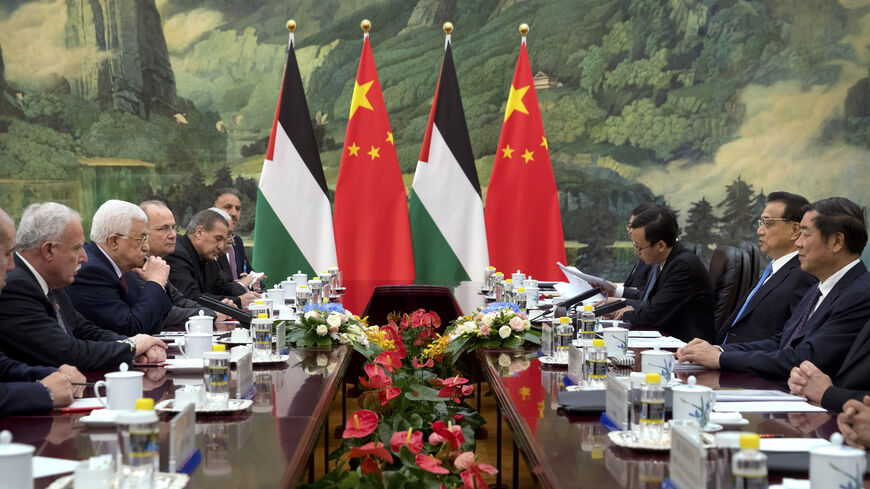When it comes to the China vs. Taiwan conflict, there is no question about where Palestine stands. In light of the recent controversial visit to Taiwan by US House Speaker Nancy Pelosi, the Palestinian presidency issued a statement saying it supports the "One China" policy. The statement also endorsed the right of Beijing to "practice its sovereignty, security and developmental rights.”
While the Palestinian leadership could have kept its position silent, the public pronouncement that was published on the official WAFA news site reflects the attempt by the Palestinian leadership to send a message to Washington in light of the latter’s lack of willingness to seriously support the struggle of Palestinians for freedom.
Yet despite this clear position, neither Palestine nor the Arab world has boycotted Taiwan economically. Taiwan is among the biggest producers of computer chips that are necessary for almost all technological products that everyone needs.
Technically, the Palestinian position is not different than that of the Arab world. In fact, on the "One China" policy, even the United States is on record as supporting it even though Washington approved the visit of Pelosi, which has angered mainland China.
Palestinian support for China has been consistent due in large part to the fact that China has been a strong supporter of Palestinian rights. China has also endorsed and supported the state of Palestine and has voted consistently with Palestine and its desire to become a full member of the United Nations.
China has been a strong supporter of the PLO as well since its creation in 1964. The PLO established a diplomatic office in China in May 1965. After the People's Republic of China was admitted to the United Nations as a member in 1971, it continued to support the Palestinian cause. An embassy of the PLO was opened in Beijing during the summer of 1974. Press reports indicate that China’s support has not been only political and financial, but there was also cooperation between China and the PLO in terms of its support and supplies to the PLO’s armed struggle against Israel.
For the latest news and top analysis on all things Palestine, subscribe to Daoud Kuttab's weekly Palestine Briefing
One of the leading personalities charged with contact with the Chinese main government was Fatah Central Council member Abbas Zaki. China has supported all self-determination motions in the UN and resolutions that condemn the Israeli occupation. China supported Palestine’s bid to become a UN non-member observer state in 2012. It has also pressured Israel to unconditionally implement UN resolutions demanding Jerusalem’s withdrawal from Palestinian territories. Chinese policymakers have described Israeli settlement constructions in the West Bank and East Jerusalem as a “violation of international law.”
China has also strengthened its ties with Fatah’s political opponent, the Hamas movement, with the hope that this would give Hamas international legitimacy.
Even though China has had a strong and close alliance with the PLO for decades, its support for the Palestinian cause has rarely moved beyond rhetorical solidarity and small-scale diplomatic engagement with Palestinian leaders.
In January 2016, during his visit to Egypt, Chinese President Xi Jinping called on the Arab League to “maintain the legitimate interests of the Palestinian people.” He unequivocally stated that China desires the creation of an independent Palestinian state with a capital in East Jerusalem. China’s escalated investment in areas like solar energy and infrastructure reveals Beijing’s commitment to ensuring that Palestine can one day become an economically viable state.
Yet despite China’s support to the PLO and to Hamas as well as investment in Palestine, China and Israel are developing more interest in each other, especially when it comes to advanced technology, and the cooperation won't be affected by external interferences, experts and industry watchers told the Global Times Aug. 1.
Israeli imports from China amounted to $13.19 billion in 2021, an increase of 39.6% year-on-year, according to the Israeli Central Bureau of Statistics. Israeli exports to China rose 4.4% in 2021 to $4.93 billion.
China has become Israel's largest trading partner in Asia and the third largest in the world.
When the two countries established diplomatic ties in January 1992, bilateral trade was only $50 million, but by 2021 it had jumped to $22.8 billion, reflecting the resilience and potential of bilateral economic and trade cooperation, Chinese Ambassador to Israel Cai Run said in a recent interview with the Xinhua News Agency








